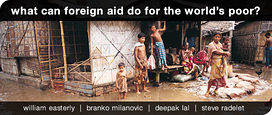So the evidence on aid indicates a mixed but somewhat positive record: modest results in many places, strong results in a few, and failure in others. This track record leaves substantial room for improvement. What are some of the key ways that aid can be made more effective in the future?
First, donors should separate politically-motivated aid from development-motivated aid. U.S. assistance to Pakistan and Jordan in the last few years has been motivated by a desire to gain support from key allies on the war on terror. Large aid flows to Egypt and Israel since 1979 were provided to help consolidate the Camp David Peace accords. Aid to Marcos and the Philippines helped keep a U.S. military presence in Southeast Asia after the Vietnam War. These are legitimate foreign policy goals, but they are not primarily about development. The U.S. should provide this kind of assistance through separate accounts and judge its success according to its impact on those objectives, rather than against a contrived development objective.
Second, donors should provide much less of their aid to middle income countries that really don’t need it. Middle income countries tend to have higher saving rates, higher tax revenues, and greater access to private capital markets, yet they historically have received more than one-third of all aid flows.
Third, donors should provide more assistance to countries that implement reasonable development policies and less to countries with lousy policies. There has been some movement in this direction in recent years, manifest most clearly in the new Millennium Challenge Account.
Fourth, donors should move away from one-size-fits all approaches, and provide aid in more varied ways depending on different country circumstances. The popular shift towards “country ownership” and more “participatory processes” makes sense in relatively better governed countries like Senegal and Ghana, but much less so in Chad or Papua New Guinea. In democracies with better governance, more aid (although not all) should go to governments, with more country-led approaches and longer time commitments. But in corrupt dictatorships, give less, make shorter commitments, keep it on a tighter leash, and give most (if not all) through NGOs and faith-based groups on the ground to deliver basic services.
Fifth, aid should be provided with clear targets and aimed at measurable results, and both donors and recipients should be held more accountable for achieved specified goals. This will require specifying up front exactly what a particular aid program is designed to achieve: building so many roads of a particular quality or immunizing a certain number of children. It will also require assessments by independent monitors, not by the aid agencies themselves.
These kinds of changes can help make aid more effective, but it is important to keep expectations realistic. Aid is no magic elixir, and other factors are more important to the development process. And under the best of circumstances, sustained development in the poorest countries of the world is a difficult, lengthy and risky business. In the future we are likely to see a number of continued failures in the most difficult and most poorly governed places, but hopefully offset by a growing number of successes.

